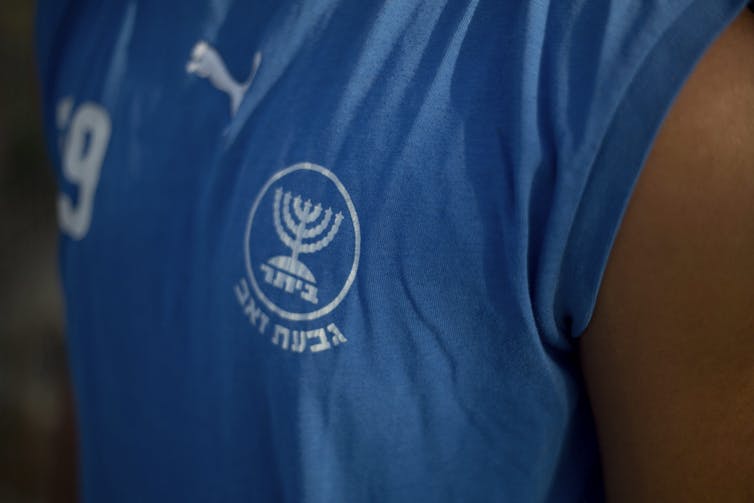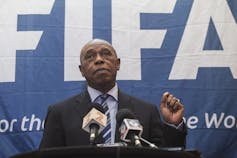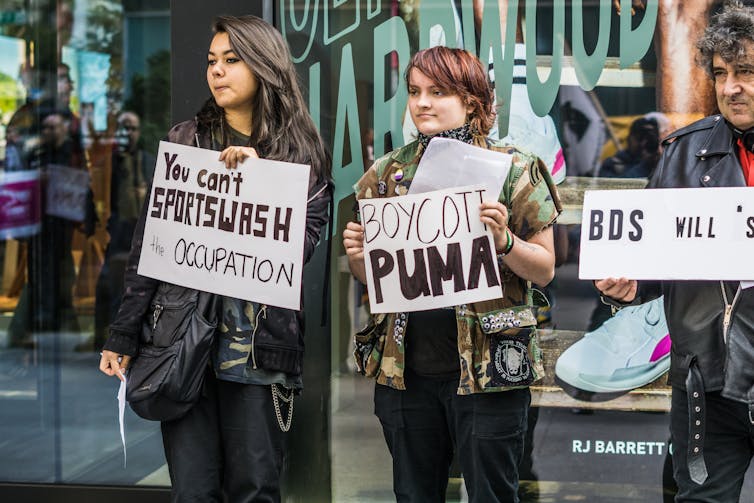Over the last four years, “Boycott PUMA” has become a rallying cry for Palestinians seeking fair treatment in international football. The German sportswear manufacturer is one of the main sponsors of the Israeli Football Association (IFA).
The Fédération Internationale de Football Association (FIFA) officially accepted the Palestinian Football Association (PFA) as a member in 1998. Yet, contrary to FIFA rules, Israeli clubs continue functioning in the PFA’s jurisdiction.
Multiple IFA clubs operate on illegally occupied Palestinian territory, extending Israel’s settler colonialist agenda into the realm of sport. Despite this violation, PUMA continues to serve as the IFA’s main sponsor.
FIFA has never been known as a human rights leader and, with the Qatar 2022 World Cup coming up next month, we fear the rights of millions will once again take a back seat to profit and nationalism.
The IFA’s refusal to cease operations in the West Bank is part of Israel’s broader suppression of Palestinian football. According to the PFA, Israeli authorities have stifled the movement of players and officials, impeded stadium and pitch projects, destroyed existing facilities and created too much instability for youth programs to function properly.
Israeli violations ignored
According to rule 71.2 of the FIFA Legal Handbook, “Member associations and their clubs may not play on the territory of another member association without the latter’s approval.” Yet, this is precisely what the IFA has been doing in Palestinian territory.

(AP Photo/Ariel Schalit)
When Russia invaded Crimea in 2014, the Union of European Football Associations (UEFA), one of the six continental governing bodies within FIFA, took very different steps. Instead of simply allowing Russia to incorporate Crimean football clubs into their national competitions, they created a new UEFA-backed professional football league.
Why is Palestinian football worthy of less?
According to Tokyo Sexwale, chair of FIFA’s Monitoring Committee Israel-Palestine, no action is being taken because FIFA “must remain neutral with regard to political matters.” This apparent double-standard comes as no surprise given FIFA’s eurocentricity. Eight of FIFA’s nine presidents have been European.

(AP Photo/Dan Balilty)
Shockingly, FIFA further announced that the “matter is declared closed and will not be the subject of any further discussion until the legal and/or de facto framework has changed.”
In short, there is one set of rules for Europe, where national sovereignty is taken very seriously, and another for Palestine, where the codified rights of the PFA are cast aside. For many activists, FIFA’s hypocrisy means they must focus on the corporations that fund Israeli’s international football violations.
#BoycottPUMA
The #BoycottPUMA campaign was created by the Boycott, Divestment and Sanctions movement (BDS) in September 2018. Utilizing social media for international impact, #BoycottPUMA is one of the top hashtags associated with the movement, generating millions of impressions online. This support has translated into several highly visible victories for activists.
In 2019, English football clubs Liverpool and Chester refused to renew deals with Puma. In 2020, Malaysia’s largest university, Universiti Teknologi MARA, dropped Puma as the official sponsor of its football team.

(Shutterstock)
PUMA has a social responsibility to ensure their products are ethically manufactured. The company claims their products are “manufactured in decent workplaces where human rights are respected,” while striving to have “a positive impact on communities where PUMA is present.”
Looking at PUMA’s operations in Palestine, it’s hard to believe such statements. Until 2021, PUMA was using Israeli licensee Delta Galil, which appears on the United Nation’s list of companies complicit in human rights violations via their operations in the occupied West Bank.
Although PUMA ended its relationship with Delta Galil, it merely shifted operations to another company located in occupied East Jerusalem, thus avoiding the UN’s list. As BDS explains, “Puma simply swapped one complicit Israeli company for another, while maintaining its sponsorship of the Israel Football Association and its support for Israel’s violent land grabs.”
Reflecting on Europe’s approach to the Middle East, celebrated Palestinian scholar Edward Said argued that “the major component in European culture is precisely what made that culture hegemonic both in and outside Europe: the idea of European identity as a superior one in comparison with all the non-European peoples and cultures.”
FIFA and PUMA are now casting a similar web of superiority. As the international community increasingly denounces Israel’s illegal occupation of Palestinian land, it must also demand that FIFA and PUMA treat Palestinians with the same dignity they afford Europeans and Israelis.